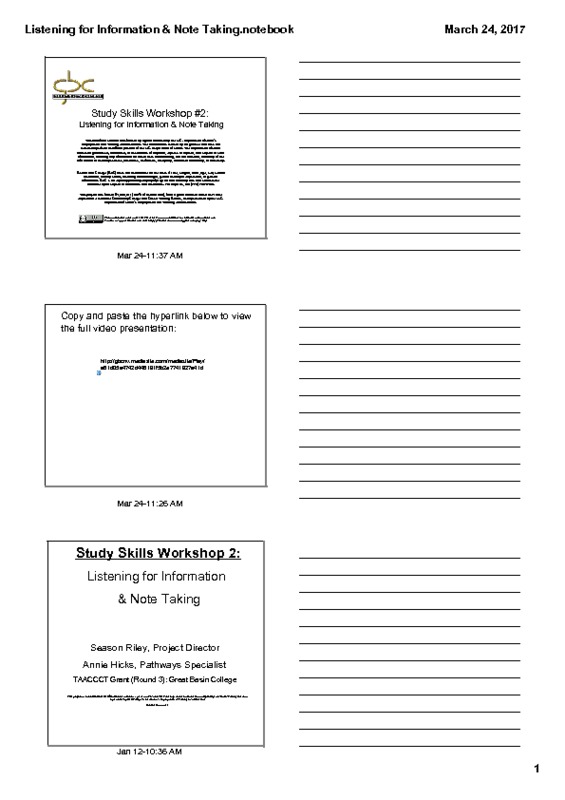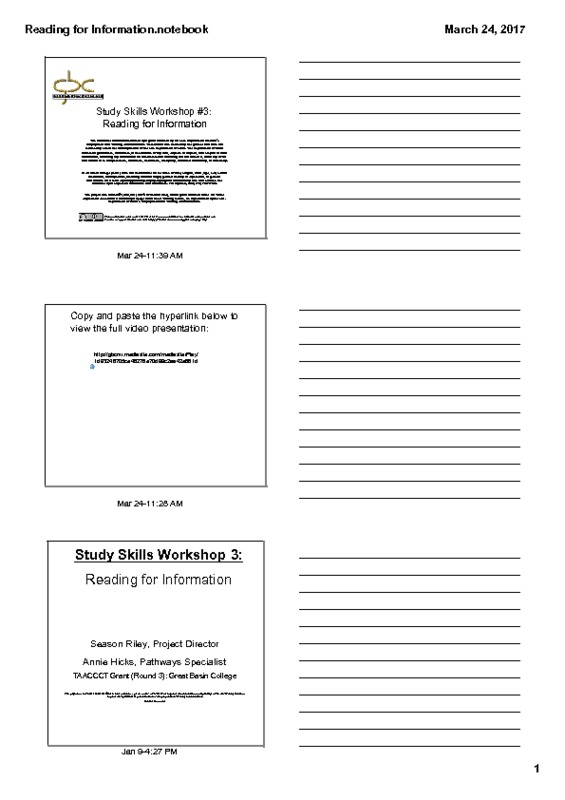Student Note-Taking and Reading Practices
TAACCCT Study Skills Workshop # 2:
Listening for Information and Note-Taking
Too many students arrive in college with poor note-taking skills. While digital technology provides an easy means of looking up and verifying factual information, note-taking is still a valuable skill in dynamic environments where relationships between facts must be captured--such as in a classroom discussion or business meeting.
In response to a request by Great Basin College Career and Technical Education (CTE) faculty, the TAACCCT Team put together a series of workshops in Fall 2016 to discuss the importance of note-taking. This ten-minute video by Season Riley and Annie Hicks covers the importance of listening closely for information, identifying key information, and placing that information in notes.
The video can be viewed through the self-containined MediaSite page (click here).
An accompanying pdf of key slides from the presentation can also be downloaded (click here).
Presentation licensed under a CC BY 4.0 License Deed
This project was funded $4,009,331 (100% of its total cost), from a grant awarded under the Trade Adjustment Assistance Community College and Career Training Grants, as implemented by the U.S. Department of Labor’s Employment and Training Administration.
TAACCCT Study Skills Workshop # 3:
Reading for Information
While note-taking is a key skill for both academic and professional life, so too is reading across multiple contexts for information..
In response to a request by Great Basin College Career and Technical Education (CTE) faculty, the TAACCCT Team put together a series of workshops in Fall 2016 to discuss the importance of reading skills. This ten-minute video by Season Riley and Annie Hicks covers the importance of listening closely for information, identifying key information, and placing that information in notes.
The video can be viewed through the self-containined MediaSite page (click here).
An accompanying pdf of key slides from the presentation can also be downloaded (click here).
Presentation licensed under a CC BY 4.0 License Deed
This project was funded $4,009,331 (100% of its total cost), from a grant awarded under the Trade Adjustment Assistance Community College and Career Training Grants, as implemented by the U.S. Department of Labor’s Employment and Training Administration.
| Taking Cornell Notes - S. Clowes (SCEduVideos) |
The Cornell Note-Taking System was developed by Dr. Walter Pauk, director of Cornell University's Reading and Study Center and author of How to Study in College. Pauk's system has been widely used in colleges since the 1960s because it provides an emphasis on synthesis, analysis, and application over simple recall of information (see Keil Jacobs, "A Comparison of Two Note Taking Methods in a Secondary English Classroom" in Proceedings: 4th Annual Symposium: Graduate Research and Scholarly Projects [79], Wichita State University, April 25, 2008). This video developed by S. Clowes covers the basics of the Cornell Note-Taking System. |

